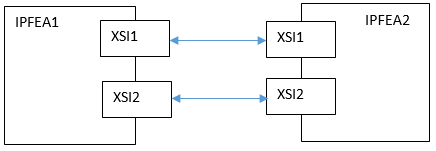3.1.12 5012 - Signaling Interface Heartbeat Timeout
- Alarm Group:
- IPFE
- Description:
- Heartbeats to monitor the liveness of a signaling interface have timed out. IPFE always monitors the working condition of its mate signaling interfaces(XSI) as an entirely separate monitoring mechanism to the synchronization channel. This is done by the IPFE server sends the heartbeat message to its mate through the signaling interfaces(XSI) using the default UDP port 19041. If the heartbeat is not received in 3000ms, then the IPFE server assumes the signaling interface is out of service, and takes over traffic from its mate. At the same time the IPFE raises the alarm 5012 .
- Severity:
- Critical
- Instance:
- The name of the Ethernet interface affected, for example, bond0.5.
- HA Score:
- Degraded
- Auto Clear Seconds:
- N/A
- OID:
- ipfeIpfeSignalingInterfaceNotify
- Cause:
-
Following is the example for the heartbeat message exchange between the IPFE mates.

- Diagnostic Information:
-
This alarm is normal for the situation where one IPFE of a mated pair has been taken down for maintenance. This alarm only needs to be acted upon if it is raised when both IPFEs are expected to be available.
- From the alarm report to determine the issue interface (eth01, bond0.313 and so on). For example, when the alarm instance shows: IPFEA1:bond0.313. The issue interface shall be IPFEA2 (mate),bond0.313.
- Then using the Wireshark to monitor if the Heartbeat messages is sent from IPFEA2, bond0.313 (no need to look into the message). If no, the issue is on IPFEA2. If yes, the issue shall be in the network.
Recovery:
- Check if any manual configuration changes have been executed that removed or reset interfaces.
- Diagnose hardware failure of interfaces, switch failure, or network outage when the issue is on the network.
- Review currently active platform alarms.
- It is recommended to contact My Oracle Support if further assistance is needed.